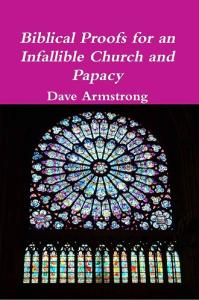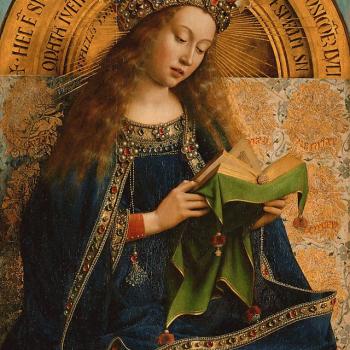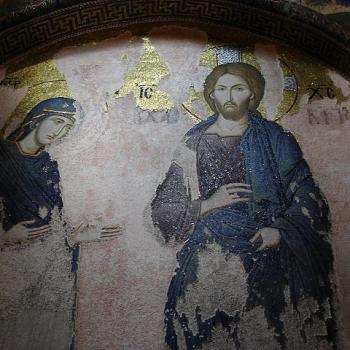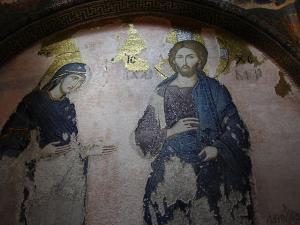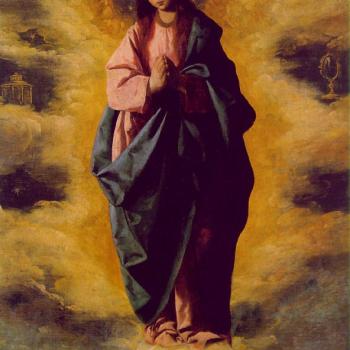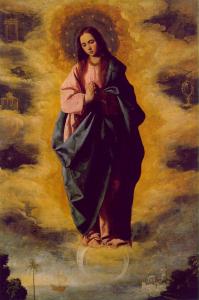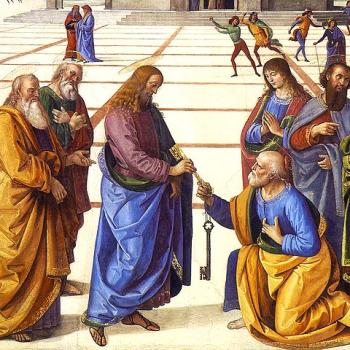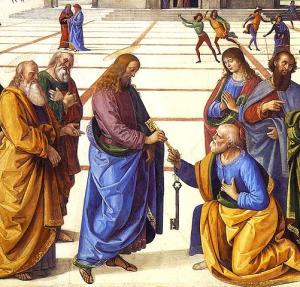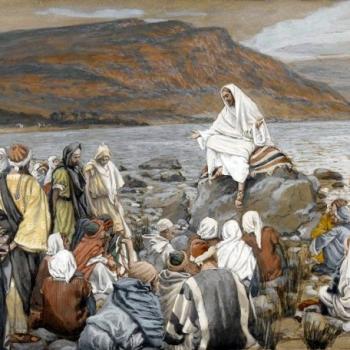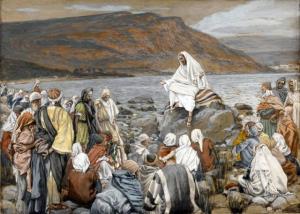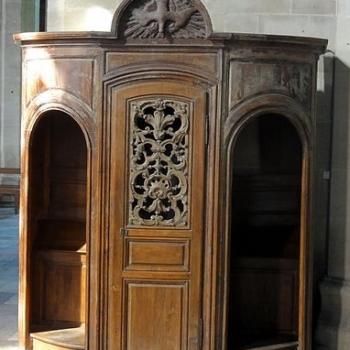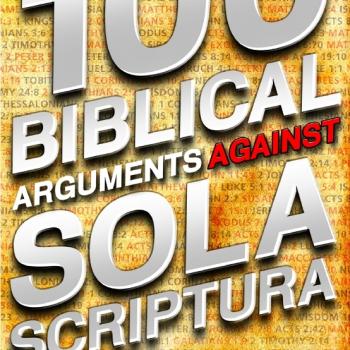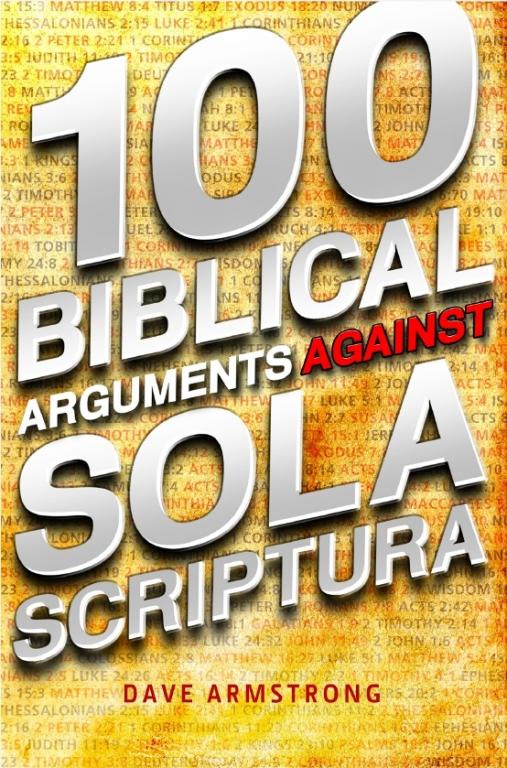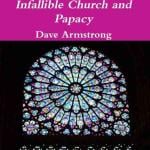[book and purchase information]
The late Steve Hays (please pray for his soul) was a Protestant Reformed, anti-Catholic apologist, very active online, who ran the site, Triablogue. I am critiquing his article about the papacy and Catholic Church government in general, entitled “Back to Babylon-1” (5-2-04). His words will be in blue.
*****
I anticipate some objecting by thinking, “why go after the writing of a dead man who can’t respond?” My reply is twofold:
1) his material is still out there, and from where Catholics sit, it is still harming those who read it and accept the relentless misrepresentations and trashings of Catholicism found therein.
2) Steve Hays never truly responded to me anyway. He would merely “toy” with my arguments, as if the whole undertaking were a joke, always in an utterly condescending, sophistical manner and in-between ten million personal insults (including his repeated insistence that I was not a real, true-blue Catholic). So there is little difference: there is no dialogue possible now, but it never took pace when he was alive, either. Accordingly, eventually he blocked me at Triablogue and I continue to be utterly ignored when I critique the top guy there now: Jason Engwer (who used to engage in many lengthy debates with me in the early 2000s). The dubious ideas and falsehoods can and should still be responded to by apologists like myself, as long as they remain online for anyone to read. In other words, it’s public material and fair game.
That out of the way, I proceed. See my past responses to Hays, related to the rule of faith:
2 Thessalonians 2:15 & Tradition [5-12-20]
1 Timothy 3:15 = Church Infallibility [5-14-20]
Does Sola Scriptura Create Chaos? [5-15-20]
Debate: Matthew 16:18-19 & the Papacy (vs. Steve Hays) [10-30-21]
Sola Scriptura: Self-Refuting? (vs. Steve Hays) [12-14-21]
Traditionally, Roman Catholicism has held that sola Scriptura is an inadequate rule of faith. And a number of one-time Evangelicals have converted to Rome for the same reason. This contention has two parts: (i) that sola Scriptura is inadequate and (ii) a Magisterium is the logical alternative to (i).
Hays misses the main underlying reason why we reject sola Scriptura: it’s not a biblical doctrine, and was never held by the Church fathers, as I have proven again and again.
Even if (i) were a sound argument, it wouldn’t automatically follow that (ii) is the logical alternative. That demands a separate argument.
That’s technically or logically correct, and we’ll get to that. But there are only so many choices in the real world. If the Protestant system is fatally defective, due to a false rule of faith, then that leaves Catholicism and Orthodoxy as the only live alternatives (assuming there is some remnant of Christianity left in the world).
I have already examined 10 objections to sola scriptura and found them wanting;
And I’ll guarantee that he never proved that sola Scriptura was actually taught in Holy Scripture. I submit that no Protestant has ever shown that. They simply assume it. Once in a while they actually openly admit this. For example, Jason Engwer wrote:
I don’t think the Bible directly, explicitly teaches sola scriptura. Rather, I think sola scriptura is an implication of Biblical teaching. . . . I don’t think 2 Timothy 3:15-17 is saying that Timothy or anybody else at that time should have abided by sola scriptura. Rather, when we combine 2 Timothy 3 with what other sources tell us about scripture and what we know about other factors involved (e.g., ecclesiology), we arrive at the conclusion of sola scriptura.” (“How To Argue For Sola Scriptura,” 1-10-18)
Lutheran pastor Jordan Cooper expressed the same idea in his video, “A Defense of Sola Scriptura“ (3-12-19):
I think the question that we have is: do we have to find a particular Scripture that says Scripture is the only authority? And I just don’t think we have to. We don’t. There’s nothing in — you can’t find — in any of Paul’s letters, for example, . . . “by the way, Scripture is the only authority and traditions are not an authority and there is no magisterium that is given some kind of infallible authority to pass on infallible teachings.” It seems like a lot of Roman Catholic apologists think that for Protestants to defend their position, that they have to find a text that says that.” [1:39-2:14]
Thanks for your refreshing honesty, guys. You happily confirm what I’ve been arguing for now 32 years. And if it’s not stated in the Bible, it’s self-refuting or self-defeating, period, end of story. Game, set, match.
now I’ll examine the case for the Magisterium—or divine teaching office of the church.
Bring it on!
In principle, sacred tradition (inclusive of Scripture) comprises the Catholic rule of faith. In practice, though, what qualifies as authoritative tradition and authoritative exegesis is determined by the Magisterium, headed by the Pope.
Authoritative interpretation is always logically required in any Christian system. Ours is the “three-legged stool” which is taught in the Bible: Bible-Tradition-Church. Documents can’t interpret themselves. Hence, we have hundreds of thousands of pages of legal analysis of the US Constitution. Protestants play the game that each one is ultimately an individual and “just goes by the Bible,” etc.
In fact, authoritative interpretation or “Protestant tradition” will always be found without much trouble, whether it’s John Calvin (Hays’ master) and his Institutes or various creeds and confessions. They hasten to add that the private judgment of each Protestant reigns supreme, but if that were truly the case, why have these other documents at all? We can back up our entire system in a way that Protestantism cannot, and in the case of sola Scriptura, we see at least a few of them finally honestly admitting this after 500 years.
Therefore, the case for the Catholic rule of faith (sacred tradition) is contingent on the case for the Magisterium, which is—in turn—contingent on the case for the papacy in particular. So this chapter will emphasize the papacy.
It can all be defended.
I. Supreme teacher in abstentia
According to Catholicism, the Pope is the supreme teacher of the church. But if that were the case, it is passing strange that of the 260 plus men—give or take an antipope—who have occupied the office, not one has been a theologian of the first rank. The intellectual firepower has come further down the chain-of-command, viz., Anselm or Aquinas, Augustine or Bonaventura, Geach or Lonergan, Maritain or Newman, Rahner or Scheeben, Scotus, Suarez or von Balthasar. It seems incongruous, to say the least, that the real shapers of Catholic thought are not the Popes, but lowly priests and laymen, with an occasional bishop thrown in. When papal advisors are more distinguished teachers than the Pope is, it makes me wonder what the job qualifications are for the papacy. It certainly doesn’t seem to be based on the principle of merit pay.
I deny his negative claim. Certainly, even in our own time, Pope St. John Paul the Great and especially Pope Benedict XVI were theologians of the first rank. There were many more, such as Pope Leo XIII, and much further back, Pope St. Leo the Great and Pope St. Gregory the Great: both considered Church fathers (and they are Doctors of the Church as well) and hence included in most collections of those men (such as Schaff’s 38-volume edition).
But that said, being a “great theologian” is not a job requirement of the papacy in the first place. The papacy is the leader and head of the Church, and the final say (“the buck stops here,” so to speak). We believe that he is protected by God when he makes infallible pronouncements, in a way that no theologian is. But it’s often the case, generally speaking, that the real thinking power and intellectual activity occurs further down the “chain of authority” in any institution. A president of a university or large corporation is only very rarely the top mind or cutting-edge intellect. In that sense, the Catholic Church is no different, excepting the aspect of direct divine protection from error in extraordinary circumstances.
But that’s not the worst of it. Whenever a case had to be made in defense of papal prerogatives during the Reformation and Counter-Reformation, who made it? Wouldn’t the Pope be the natural candidate to present the case for his own preeminence? But, no. Once again, none the big guns were Popes, but men who spoke on behalf of the papacy, viz., Fisher, Eck, Cajetan, Bellarmine and Stapleton. Now if the Pope is supposed to be the supreme teacher of the Church, then why can’t he speak for himself? Can’t he even make a case for himself? If he isn’t up to the job of laying out his own credentials for the job, then what does that say about his credentials for the job?
Again, aside from what I stated above, this is usually the case in any Christian communion. So for example, the great figures or minds in Anglicanism, such as John Wesley and John Henry Newman before 1845, were priests, and not Archbishops of Canterbury. Few would say that, for example, the President of one of the Lutheran synods or of the Southern Baptist Convention would or should be the most profound theologian of those communions. Billy Graham was never the head of any denomination. Probably a lot of this has to do with the fact that leaders and bosses are often bogged down with administrative or “business” duties, and thinkers and activists normally hate those things, or are not qualified for them. They have more “pressing” and “exciting” matters and ideas to attend to.
Even John Calvin’s Institutes (though in practice almost regarded as infallible) is not the authoritative document for Reformed Christians. That would be found in their various confessions. Sometimes such men may happen to also be governmental leaders, as in the case of popes, but it’s not their primary purpose. Why make this an issue, then? It’s misguided and wrongheaded (albeit clever, as much of Hays’ rhetoric was).
What would be our impression if a search committee were scheduled to interview a job applicant for a teaching position, yet the applicant didn’t show up in person, but sent a spokesman in his place? The Pope flaunts his divine résumé, but then hides behind a phalanx of handlers and spin-meisters.
This is simply sophistry, based on the false premise exposed above.
On the one hand, Luther and Calvin were quite able to make their own case, even though their critics denied the right of private judgment. On the other hand, their critics had to do all the talking for the papacy.
Yes, they made their case, and they were not denominational leaders in the way that the pope functions (which is precisely my point). They were the intellectual and theological leaders and figureheads of the Protestant Revolt or Revolution. I wish I had a dime for every time a Lutheran (quite needlessly) pointed out to me that Luther’s writings have no binding authority for the individual Lutheran. Rather, that role is played by the Book of Concord (which includes Luther’s and his successor Melanchthon’s writings, but only a small portion of them).
Apples and oranges. Same with the papacy. This ain’t rocket science. Hays could certainly milk a demonstrably false presence for all it was worth (with his followers blissfully unaware that he was doing it). But the conclusions are no more compelling than the miserable foundation of sand that they are drawn from.
II. Bashful Magisterium.
For a denomination that regards the right of private judgment as so spiritually perilous, the Roman Church has shown itself to be remarkably shy about formally and infallibly committing itself on a wide range of fundamental questions in faith and morals.
One can only chuckle that we get slammed for having so many infallible dogmas and doctrines, but also simultaneously for not infallibly expounding on everything, (as if this is what our system is or should be), including the best recipe for apple pie. That’s anti-Catholicism: Catholicism is and must be wrong, no matter what it does or states.
Why has an ecumenical council never issued an infallible catechism?
Because that’s a contradiction in terms. Infallible doctrines are relatively rare occurrences, and so that characteristic could never apply to an entire catechism. This is elementary, but as usual, Hays didn’t get it. And in his stupefied ignorance of Catholicism as it actually is and seeks to be, he inevitably descended to mockery and caricature.
Why has the papacy never produced an ex cathedra commentary?
Again, this fundamentally misunderstands the relationship of Bible commentary and exegesis to Catholic authority. The Church does not force Catholics to believe thus-and-so about every passage in the Bible. In fact, I would say it does so far less than the system of Calvinism does. In fact, Catholic exegetes are quite free, and the Church has only authoritatively proclaimed an binding, authoritative interpretation for only seven to nine Bible verses.
But what we instead witness is an organization that brandishes maximal authority-claims while venturing minimal truth-claims. It bears a sneaky resemblance to a psychic who dons an air of superior foresight while remaining strangely vague about names, dates, and places.
Classic and textbook, quintessential Hays mockery-caricature. This sort of thing is why I mostly refused to interact with his criticisms. It was unworthy of serious response. Yet people are still being led astray by it (and the apologist is duty-bound to try to offer a better way). This is the constant “trial of patience” of the Catholic apologist. How much can we take of such material without being slowly driven insane? Yet by God’s grace only we plunge ahead . . .
Shouldn’t one of the singular advantages of a divine teaching office be to anticipate and head-up a major controversy before it erupts, rather than engage in damage control? How was the Reformation even possible with a living Magisterium on the scene?
Again, a scenario which a Christian communion primarily responds to heresies is nothing unusual or out of the ordinary. It was what the Church fathers did all the time. Entire ecumenical councils were based on that. Their task wasn’t to predict coming heresies, but to dissect existing and increasingly influential ones. Everybody knows this (and Steve did, too, but he simply couldn’t resist sophistry). Cardinal Newman said something like, “no doctrine is defined [i.e., fully developed] until it is violated.”
A so-called “Reformation” was possible because men are rebellious against authority by nature, and because (yes) the Catholic Church needed reform as she always does at all times. The myth, however, is that Protestantism was so extraordinarily superior; as if it had no serious shortcomings in practice (before we even get to doctrine) that it excoriated Catholicism for having. It’s the double standard and myth-making and “Protestant hagiography” that I never ever bow to. I know too much, and can never go back to my former “brainwashed evangelical” ignorance about the history and nature of Catholicism.
III. Without Intertestamental precedent:
A traditional pillar of the papal apologetic has been the contention that unless a living Magisterium, headed by the Pope, existed throughout the life of the Church, the people of God would lapse into heresy and apostasy.
But as a matter of fact, this surmise has already been put to the test. During the Intertestamental period—an interval of about 400 years between the composition of the Old and New Testaments—there was no charismatic office in place to offer the people infallible guidance in faith and morals or unerring interpretations of the law and the prophets. Yet compared with the times leading up to the Assyrian deportation and Babylonian exile, when the people did enjoy special guidance, and went awhoring all the same, this is one of the more zealous chapters in the nation’s history.
During the Intertestamental period, the people’s only recourse was to sola scriptura—which then amounted to the OT canon. In the providence of God, there was nothing equivalent to a Magisterium during the Intertestamental period.
To directly refute Hays’ contentions here, then, we must analyze whether this period was as glorious and “orthodox” as Hays seems to assume. I would point to the emergence of the Sadducees in the 2nd c. BC. They were the “theological liberals” of their time and precisely prove my point. I made an argument about them with regard to the rule of faith in ancient Israel in a 1999 article (abridged for my present purposes):
The Sadducees were much more “heretical.” They rejected the future resurrection and the soul, the afterlife, rewards and retribution, demons and angels, and predestinarianism. Christian Pharisees are referred to in Acts 15:5 and Philippians 3:5, but never Christian Sadducees. The Sadducees’ following was found mainly in the upper classes, and was almost non-existent among the common people.
The Sadducees also rejected all “oral Torah,” — the traditional interpretation of the written that was of central importance in rabbinic Judaism. So we can summarize as follows:
A) The Sadducees were obviously the elitist “liberals” and “heterodox” amongst the Jews of their time.
B) But the Sadducees were also the sola Scripturists of their time.
C) Christianity adopted wholesale the very “postbiblical” doctrines which the Sadducees rejected and which the Pharisees accepted: resurrection, belief in angels and spirits, the soul, the afterlife, eternal reward or damnation, and the belief in angels and demons.
D) But these doctrines were notable for their marked development after the biblical Old Testament canon was complete, especially in Jewish apocalyptic literature, part of Jewish codified oral tradition.
The very existence of the Sadducees is a testament (no pun intended) to what happens if a principle of sola Scriptura is followed (as in their own case), and tradition (including oral tradition) is rejected: heterodoxy. Therefore, I assert what Hays denied: without a strong theological authority in place, the Jews would and indeed did “lapse into heresy and apostasy”: in the case of the Sadducees. The Essenes, another prominent Jewish sect that began in the 2nd c. BC, also denied the resurrection of the body. The Pharisees (like Christians) affirmed it, and oral law received on Mt. Sinai and oral tradition. So now we see that two of the three predominant Jewish groups of the period “lapse[d] into heresy”: despite Hays’ claims to the contrary. Prior to these unfortunate developments, the Jews had accepted a doctrine of the afterlife, and at length, even a bodily resurrection. See:
Jewish and Old Testament Views of Hell and Eternal Punishment [4-14-04]
Salvation and Eternal Afterlife in the Old Testament [8-31-19]
It developed slowly, but was in place when Jesus came onto the scene. The Sadducees and the Essenes (like the various heretical sects of Church history) did their best to undermine these beliefs, in their heresy.
IV. Without OT precedent:
Even during the dispensation of OT inspiration, special revelation was sporadic (cf. 1 Sam 3:1). While the nation as a whole fell away, God’s word sufficed to preserve his elect. Rahner himself admits that, “before the church of Christ this absolute authority of a teaching office did not exist. The OT knew of no absolute and formal teaching authority which was recognized as such. Its ‘official’ representatives themselves could fall away from God, his revelation and his grace,” Foundations of Christian Faith (Seabury 1990), 378.
“There was no infallible teaching authority—not even before the death of Christ—in the OT, in the sense of a permanent institution, which had this inerrant character. There were prophets every now and again. But there was no infallible Church,” Inspiration in the Bible (Herder & Herder, 1961), 52.
The is largely untrue. I dealt with this sort of clever but misguided argument in the following dialogue: Dialogue with a Lutheran on Ecclesiology & OT Indefectibility Analogies (vs. Nathan Rinne) [11-22-11] and in my articles:
*
Sola Scriptura, the Old Testament, & Ancient Jewish Practice [1999]
*
Inspired & Infallible Prophets: Analogy to Infallible Popes [2-2-10]
Levites and the Old Covenant System vs. Sola Scriptura [4-9-06]
OT Levites & Priests: Closer to Sola Scriptura or Catholicism? [4-9-06]
V. Nonconformity in the OT:
In this section, Hays delves into the Pharisees and especially Matthew 23:2-3. I have dealt with these issues at extreme length (no need to repeat myself):
VI. Vox populi, vox Dei?
Vatican II grants that the community of faith is infallible in faith and morals when a popular consensus obtains (Lumen Gentium 12). But if that is so, then why bother with a Magisterium at all?
12. The holy people of God shares also in Christ’s prophetic office; it spreads abroad a living witness to Him, especially by means of a life of faith and charity and by offering to God a sacrifice of praise, the tribute of lips which give praise to His name. The entire body of the faithful, anointed as they are by the Holy One, cannot err in matters of belief. They manifest this special property by means of the whole peoples’ supernatural discernment in matters of faith when “from the Bishops down to the last of the lay faithful” they show universal agreement in matters of faith and morals. That discernment in matters of faith is aroused and sustained by the Spirit of truth. It is exercised under the guidance of the sacred teaching authority, in faithful and respectful obedience to which the people of God accepts that which is not just the word of men but truly the word of God. Through it, the people of God adheres unwaveringly to the faith given once and for all to the saints, penetrates it more deeply with right thinking, and applies it more fully in its life. [my bolding and italics]
Catholicism has invoked three Petrine prooftexts in support of papal primacy (Mt 16:18-19; Lk 22:32; Jn 21:15-17). But this appeal falls flat on numerous counts:
1. Non-sequitur:
Even if the passages did imply Petrine primacy, that doesn’t imply papal primacy.
We certainly can in precisely the same way that the OT typology of “David as the prototype of the Messiah” implies Jesus Christ, or how Elijah was a prototype for John the Baptist, etc.
2. Hidden assumptions
Catholicism doesn’t take these texts on their own terms, but has instead allowed the papacy itself to supply the comparative frame of reference. If the papacy didn’t already exist in his mind to color his expectations, a Roman Catholic wouldn’t discover it in these passages, for they’re concerned with the role of Peter, which is historically prior to, and logically independent of, the development of the papacy. Just try that mental experiment yourself. Imagine that you’d never heard of the papacy. Would reading these verses suggest the papacy, all by themselves? You can only “see” the papacy in these verses because you’ve seen the papacy outside these verses. What a Catholic reader is sees in these verses in not an image of the papacy, but the historical afterimage of the papacy, superimposed on these verses.
Ironically, Protestants polemicists have historically employed a parallel mode of reasoning to disprove papal claims by finding Mt 23:8-10, 2 Thes 2:3-4,8-9 and Rev 13:6 fulfilled in the institution of the papacy. So the Catholic appeal cuts both ways. It either proves too much or too little. Its method of papal proof could be redeployed as a method of papal disproof.
Insofar as you can find a parallel between the Petrine texts and the papacy, that is in the nature of a self-fulfilling prophecy. With the advantage of hindsight, the papacy has modeled itself on the Petrine texts. Thus, when it reads these verses it sees a reflection of itself staring back. But that’s a case of historical impersonation rather than prophetic foresight—like a vaticinium ex eventu. If, after the fact, the cast yourself in the very terms of fulfillment, then—voila! —you see your own face at the bottom of the well.
[I have rearranged the sections so the themes / arguments are placed together)
Mt 16:18 is the primary Petrine text. But a direct appeal to Mt 16:18 greatly obscures the number of steps that have to be interpolated in order to get us from Peter to the papacy. Let’s jot down just a few of these intervening steps:
One of the apostles (Judas) was replaced with another (Matthias) and that is in the Bible. Therefore, why wouldn’t Peter also be replaced, as the manifest leader of the apostles (and according to Jesus, the leader of the Church)?Secondly, why would there be a leader of the Church only for the lifetime of Peter? No one ever thinks like that about other offices of leadership. If a country is a monarchy, it has a succession of kings. We have a succession of Presidents in America. No one would think in 1789 that we should have George Washington to be our one and only President and then we would no longer need a President at all.
There is solid evidence that he did and that his bones were found there, in the area where St. Peter’s is now.
Eusebius:
All that time most of the apostles and disciples, including James himself, the first Bishop of Jerusalem, known as the Lord’s brother, were still alive . . . (History of the Church, 7:19, tr. G. A. Williamson, Baltimore: Penguin Books, 1965, 118)
James is called an apostle by St. Paul in Galatians 1:19 and 1 Corinthians 15:7. That James was the sole, “monarchical” bishop of Jerusalem is fairly apparent from Scripture also (Acts 12:17; 15:13, 19; 21:18; Gal 1:19; 2:12).
In Mark 6:30 the twelve original disciples of Jesus are called apostles, and Matthew 10:1-5 and Revelation 21:14 speak of the twelve apostles. After Judas defected, the remaining eleven apostles appointed his successor, Matthias (Acts 1:20-26). Since Judas is called a bishop (episkopos) in this passage (1:20), then by logical extension all the apostles can be considered bishops (albeit of an extraordinary sort).
If the apostles are bishops, and one of them was replaced by another, after the death, resurrection, and ascension of Christ, then we have an explicit example of apostolic succession in the Bible, taking place before 35 A. D. In like fashion, St. Paul appears to be passing on his office to Timothy (2 Tim 4:1-6), shortly before his death, around 65 A.D. This succession shows an authoritative equivalency between apostles and bishops, who are the successors of the apostles.
ii) Even if he had, there is no exegetical evidence that the imposition of hands is identical with Holy Orders.
Acts 9:17 (RSV) So Anani’as departed and entered the house. And laying his hands on him he said, “Brother Saul, the Lord Jesus who appeared to you on the road by which you came, has sent me that you may regain your sight and be filled with the Holy Spirit.”
Acts 13:1-4 Now in the church at Antioch there were prophets and teachers, Barnabas, Simeon who was called Niger, Lucius of Cyre’ne, Man’a-en a member of the court of Herod the tetrarch, and Saul. While they were worshiping the Lord and fasting, the Holy Spirit said, “Set apart for me Barnabas and Saul for the work to which I have called them.” Then after fasting and praying they laid their hands on them and sent them off. So, being sent out by the Holy Spirit, they went down to Seleu’cia; and from there they sailed to Cyprus.
1 Timothy 4:11-16 Command and teach these things. Let no one despise your youth, but set the believers an example in speech and conduct, in love, in faith, in purity. Till I come, attend to the public reading of scripture, to preaching, to teaching. Do not neglect the gift you have, which was given you by prophetic utterance when the council of elders laid their hands upon you. Practice these duties, devote yourself to them, so that all may see your progress. Take heed to yourself and to your teaching; hold to that, for by so doing you will save both yourself and your hearers. (cf. 1 Tim 5:22; Heb 6:2)
2 Timothy 1:6 Hence I remind you to rekindle the gift of God that is within you through the laying on of my hands;
iii) Even if we went along with that identification, Popes are elected to papal office, they are not ordained to papal office. There is no separate or special sacrament of papal orders as over against priestly orders. If Peter ordained a candidate, that would just make him a pastor (or priest, if you prefer), not a Pope.
He’s a bishop of bishops. Hence, no need for further ordination. He simply becomes the highest and most sublimely gifted of the body of bishops.
But to put a sharper point on things, every argument for Petrine primacy is an argument against papal primacy since the more that Catholicism plays up the unique authority of Peter, as over against the Apostolic college, the less his prerogatives are transferable to a line of successors. There’s a basic tension between the exclusivity of his office vis-à-vis the Apostolate and the inclusivity of his office vis-à-vis the Episcopate.
In the text before us, the promises were made to the person of Peter, in contradistinction—as Catholicism would have it—to the person of James, John, or Paul. They were all apostles. That is not the distinguishing feature. And the Petrine texts don’t draw a distinction between the office and office-holder. Of course, the papal apologist is free to multiply his own distinctions, but these are devoid of textual support.
Acts 23:1-5 And Paul, looking intently at the council, said, “Brethren, I have lived before God in all good conscience up to this day.” [2] And the high priest Anani’as commanded those who stood by him to strike him on the mouth. [3] Then Paul said to him, “God shall strike you, you whitewashed wall! Are you sitting to judge me according to the law, and yet contrary to the law you order me to be struck?” [4] Those who stood by said, “Would you revile God’s high priest?” [5] And Paul said, “I did not know, brethren, that he was the high priest; for it is written, `You shall not speak evil of a ruler of your people.'”
*
Practical Matters: Perhaps some of my 4,000+ free online articles (the most comprehensive “one-stop” Catholic apologetics site) or fifty-one books have helped you (by God’s grace) to decide to become Catholic or to return to the Church, or better understand some doctrines and why we believe them.
Or you may believe my work is worthy to support for the purpose of apologetics and evangelism in general. If so, please seriously consider a much-needed financial contribution. I’m always in need of more funds: especially monthly support. “The laborer is worthy of his wages” (1 Tim 5:18, NKJV). 1 December 2021 was my 20th anniversary as a full-time Catholic apologist, and February 2022 marked the 25th anniversary of my blog.
PayPal donations are the easiest: just send to my email address: [email protected]. You’ll see the term “Catholic Used Book Service”, which is my old side-business. To learn about the different methods of contributing, including 100% tax deduction, etc., see my page: About Catholic Apologist Dave Armstrong / Donation Information. Thanks a million from the bottom of my heart!
***
Summary: I systematically dismantle the caricatures of the papacy invented by the late anti-Catholic Reformed Protestant apologist Steve Hays, from the Bible and logic.



